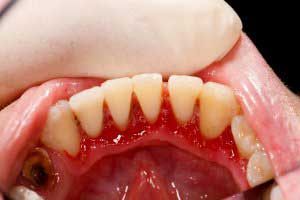Spotting the Symptoms of Periodontal Disease

Periodontal disease, or gum disease, is a very serious disorder that can cause a number of different health problems if left untreated. Periodontal disease increases your risk of heart disease, diabetes, and stroke. Early detection and treatment by a dentist or periodontist in Westlake is key to avoiding tooth loss and health problems. Keep reading to learn about the signs and symptoms of periodontal disease.
Plaque and Tartar Buildup
Periodontal disease is often caused by poor oral hygiene. If you don’t brush or floss regularly, dental plaque will begin to build upon your teeth. When plaque is untreated, it will eventually harden and become tartar. Tartar can harbor harmful bacteria that can cause infections of your gums, and eventually will lead to gingivitis or periodontal disease. You can avoid plaque buildup by maintaining excellent dental hygiene. Once tartar forms, it can only be removed by a professional dental cleaning from a dentist or periodontist.
Gingivitis
Gingivitis is a mild form of gum disease and is often the precursor of gum disease if not treated. Gingivitis is an inflammation of the gums that causes the gums to become red, swollen, and tender. The gums may bleed easily, making them susceptible to infection. Gingivitis can be treated by a dentist or periodontist. If it is caught early and treated effectively, it will not progress to gum disease or periodontal disease. Gingivitis does not cause tooth loss or bone loss.
Gum Inflammation and Infection
When gingivitis is not treated by a dentist or periodontist, it will develop into periodontal disease. The primary symptom of periodontal disease is gum inflammation and pain. The gums begin to pull away from the teeth, creating pockets that can become infected. This infection can spread and grow below the gum line. As your body responds to the infection, your bones and connective tissues will begin to break down and degenerate. If not treated by a dentist or periodontist, the bones, gums, and tissues may become destroyed, resulting in bone and tooth loss.
